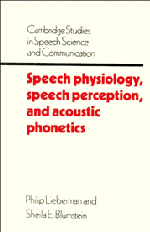Book contents
- Frontmatter
- Contents
- List of figures
- Preface
- Acknowledgements
- 1 Introduction
- 2 A qualitative introduction to the physiology of speech
- 3 Basic acoustics
- 4 Source–filter theory of speech production
- 5 Speech analysis
- 6 Anatomy and physiology of speech production
- 7 Speech synthesis and speech perception
- 8 Phonetic theories
- 9 Some current topics in speech research
- 10 Acoustic correlates of speech sounds
- Bibliography
- Index
8 - Phonetic theories
Published online by Cambridge University Press: 05 June 2012
- Frontmatter
- Contents
- List of figures
- Preface
- Acknowledgements
- 1 Introduction
- 2 A qualitative introduction to the physiology of speech
- 3 Basic acoustics
- 4 Source–filter theory of speech production
- 5 Speech analysis
- 6 Anatomy and physiology of speech production
- 7 Speech synthesis and speech perception
- 8 Phonetic theories
- 9 Some current topics in speech research
- 10 Acoustic correlates of speech sounds
- Bibliography
- Index
Summary
Phonetic theories, like all scientific theories, depend on a particular database and the research techniques that are used to derive that database. Phonetic theories relate the physical attributes of sounds with their linguistic function. Thus the linguistic relevance of particular sounds must be considered as well as acoustical and articulatory data. We could provide an “exact” recording of the speech sounds of a language by making a set of tape recordings which would preserve all of the acoustic attributes of the signals that served as a medium of vocal communication. However, we would not have isolated the linguistically significant phonetic elements that were used in this language. We would not, for example, be able to predict the possible words of this language. We could start on a phonetic analysis of these tape recordings by listening to them and attempting to isolate phonetic elements. Of course, we would be abstracting elements from the encoded stream of sounds using our internal speech-decoding devices. Our task would be simpler if we had also recorded native speakers producing isolated words, and it would be much simpler if we had the services of a bilingual “informant” who spoke our language and the language that we were attempting to analyze.
It would be best if we were analyzing our own native language, but we would nonetheless have to remember that we could not derive the acoustic correlates of phonetic elements without making use of acoustic analysis, synthesis, and psychoacoustic experiments.
- Type
- Chapter
- Information
- Speech Physiology, Speech Perception, and Acoustic Phonetics , pp. 162 - 204Publisher: Cambridge University PressPrint publication year: 1988



